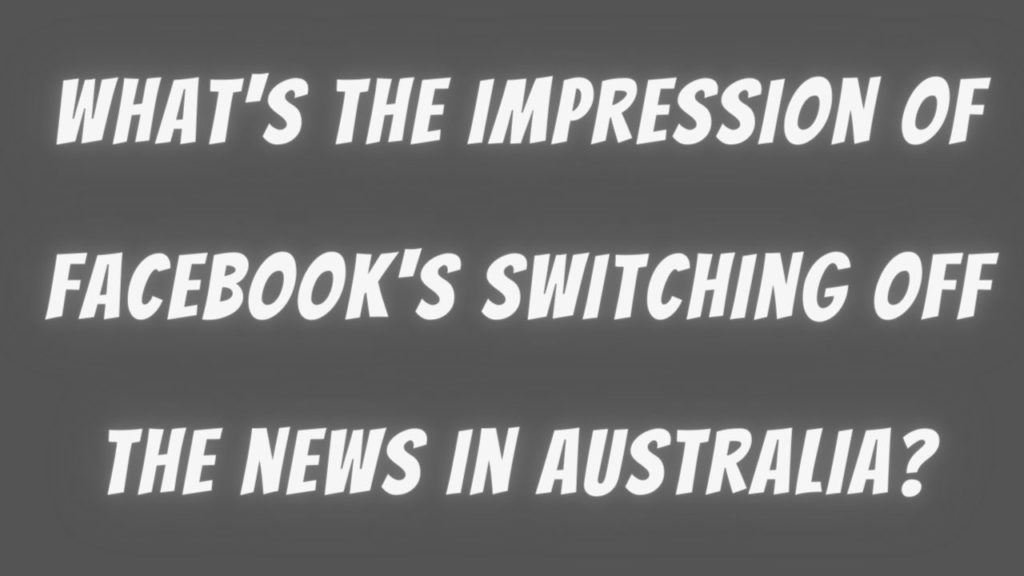As per a powerful repel to new media bargaining laws of Australia, Facebook took a decision. Facebook has taken a judgment that they would black out news content from their social networking platform Down Under.
Facebook called it their last option. They declared that the people along with publishers in Australia would ‘stop allowing’ the option of sharing any news on Facebook and Instagram.
It doesn’t matter whether the news is local or international, but it can’t share on social media platforms.
Now the question arises, what do they mean for people and publishers?
All over the work, Facebook is used as a means to circulate information towards the audience.
Mainly, the publishers use Facebook as a tool to access viewers who use it as a content consumption platform. Those audiences can increase publishers’ reach and revenue.
You may also read Coronavirus: If your mask doesn’t pass these three tests, it is not helping
Even users again share most of the news content that adds to their virality.
All this is the result of millions of visits to news sites referenced from Facebook’s timeline.
However, the Publishers also have the commercial basis of an agreement with Facebook.
That agreement allows the social network to introduce their content as instant articles. Instant Articles are the one that opens up faster in comparison of publisher pages.
William Easton, the Managing Director of Facebook Australia and New Zealand, claimed in a blog post regarding how the new laws would work against the publishers: “Last year Facebook generated approximately 5.1 billion free referrals to Australian publishers that is worth of an estimated AU$407 million”.
Let us take a look at the top Australian news sites as Sydney Morning Herald, News.com.au, and The Australian on analytics site Similarweb. These sites show the result that they were having all the 7-9% traffic from social media platforms.
On these platforms, Facebook is the primary one who drives the traffic to the news website. But because of Facebook’s latest move, most of the traffic and revenue will fade away.
What is Media bargaining law in Australia?
Australia’s new media bargaining code that brought in Parliament last December. As per it, it is required for large tech companies such as Google and Facebook to contract with news outlets, resulting in a commercial contract to show subsequent content on their platforms.
Right now, if we look at news publishers all over the world, they get revenues only from the portion of the ad generated from their content or through an agreement for creating instant articles.
You may also read DnD game got a level up
Moreover, there is no stability of this revenue. Revenue is dependent mostly on the algorithms on the two platforms. That algorithm keeps on changing simultaneously that leaves an impression on visibility and reach.
Interestingly, although Google equally unhappy with the code. At the same time, Google has signed an AUD30 million yearly deal with Seven West Media to showcase its content on multiple platforms of search engines.
This deal was followed by another deal with Nine Entertainment Company and a three-year deal on Wednesday (17 February) with Rupert Murdoch’s News Corp for a “significant payment” that owns The Australian, The Daily Telegraph, and The Herald Sun.
What is the issue of Facebook with the code?
Furthermore, Easton tried to highlight one thing in the blog post that fundamentally, the code misunderstands our platform and publishers’ friendship. That platform and publishers use it to share news content. But now they don’t have any choice so decided to allow news content and its services.
Even, he also tried to show a difference between Facebook and Google’s relationship with publishers. Google search is inexorably linked with news, and publishers do not provide their content voluntarily.
On the other hand, Easton wrote, “publishers voluntarily choose to post news on Facebook, as it allows them to sell more subscriptions, increase their audience and increase advertising revenue.”
However, it was also argued that Google is prepared to deal with publishers, but not Facebook.
How does the deal affect Facebook?
Facebook said not much, but the news made something less than 4% of the content people used to see in their news feed.
You may also read Coronavirus Vaccine: Ways To Boost Your Immune Response Towards The COVID-19 Vaccine
In recent years, Facebook seems less interested in news. It is because their interest moves towards video content that drives people’s interest within the network.
The way news feeds were experienced during the 2016 US presidential elections has made it careful of becoming a significant platform for news.
Actually, the UK was the first country that got separate Facebook news in late January. They called it a destination within the Facebook app that features news from hundreds of major national, local, and lifestyle outlets.
This appears to be an attempt to move news even further away from the feed and inhabit a separate tab.
Facebook claimed that Australia is one of the markets where it needs to be rolled out. While they have to wait now till the time, there would be more clarity on the law.
What does this mean for the rest of the world?
Facebook and Google fear that action in Australia may trigger similar laws worldwide. For example, Google is already making deals with publishers in countries such as France. It could also accelerate Facebook’s plans to rollout Facebook news to other geographies and thus make the influx of news more contractual.


